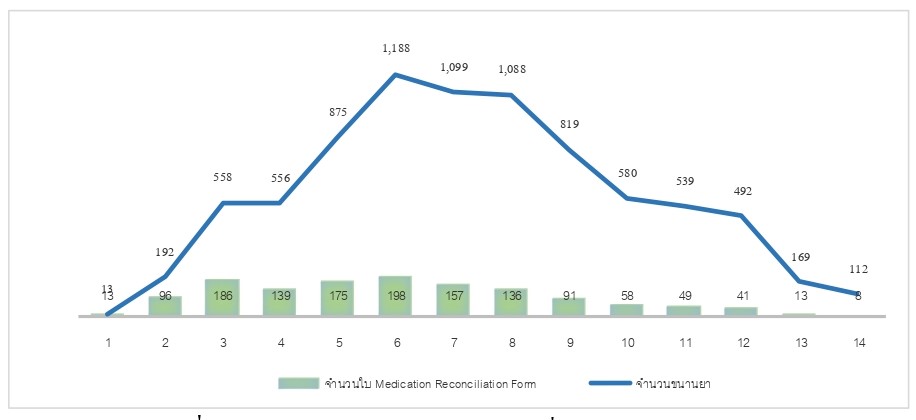The Effect of Medication Reconciliation Process on Medication Errors at Medical Ward in Sungai Kolok Hospital
Keywords:
Medication Reconciliation, Severity level, Type, Medication ErrorsAbstract
The objectives of this retrospective descriptive study were to examine the effect of the medication reconciliation process, the quantity, nature, and degree of severity of medication errors, as well as the correlation between medication reconciliation and the type and magnitude of medication errors that occurred in the medical ward. Patients with past medication histories who were admitted to the medical ward at Sungai Kolok hospital between October 1, 2022, and September 30, 2023, served as samples of this study. Data was gathered from the hospital data-based system and the medication reconciliation form. Based on inclusion and exclusion criteria, the results showed that 1360 samples of 2760 patients had a history of medical usage prior to admission. The majority of 1008 patients had either hypertension alone or hypertension in conjunction with another illness. Pharmacists discovered medication errors in 324 patients throughout the admission period and 134 patients during the hospital discharge procedure. The three highest levels of medication errors were ordering medications that were not on the hospital list, making omission errors, and changing the dosage and mode of medication use. Only medication errors in severity levels B and C were discovered. Analyzing the relationship between medication reconciliation and the type and magnitude of medication errors revealed that there were statistically significant relationships between medication reconciliation and medication errors found in each severity level (p < 0.001) and the medication reconciliation process had statistically significant relationships with the type of medication errors regarding commission errors (P-value = 0.042). However, in this study no statistically significant relationship was found between the medication reconciliation process with other types of medication errors.
References
Abdulghani, K.H., Aseeri, M.A., Mahmoud, A., & Abulezz, R. (2018). The Impact of Pharmacist-led Medication Reconciliation during Admission at Tertiary Care Hospital. International Journal of Clinical Pharmacy, 40(1), 196 - 201. https://doi.org/10.1007/s11096-017-0568-6
Chanatepaporn, P., Anutchatchaval, S., & Nakornratanachai, P. (2014). Development of Medication Reconciliation at Female-Medicine Ward in Srinagarind Hospital. Srinagarind Medical Journal, 29(3), 276 - 282. https://li01.tci-thaijo.org/index.php/SRIMEDJ/article/view/19853
Chatwiriyawong, C., & Tulapunt, S. (2018). Effect of Medication Reconciliation in Medicine Ward at Sawanpracharak Hospital. Sawanpracharak Medical Journal, 15(3), 95 - 102. https://thaidj.org/ index.php/smj/article/ view/6071
Hemajula, A., Suantong, C. (2016, December 1). Synchronization of Medication Lists Medication Reconciliation: Another Measure to Increase Safety in the Drug System. Center for Continuing Pharmacy Education. https://ccpe.pharmacycouncil.org/index.php?option= article_detail&subpage=article _detail&id=174
Karaoui, L.R., Chamoun, N., Fakhir, J., Ghanem, W.A., Droubi, S., Marzouk, A.R.D., Droubi, N., Masri, H., & Ramia, E. (2019). Impact of Pharmacy-led Medication Reconciliation on Admission to Internal Medicine Service: Experience in Two Tertiary Care Teaching Hospitals. BMC Health Services Research, 19(1), 1 - 9. https://doi.org/10.1186/s12913-019-4323-7
Ningsanon, T. (2008). Medication Reconciliation. In T. Ningsanon T, P. Montakantikul P, & S. Chulavatnatol S (Eds.), Medication Reconciliation (pp. 2 -– 26). Prachachon.
Nuntasena, K. (2021). The Study of Medication Error, Cost Savings and Cost Avoidance of Medication Reconciliation at Inpatient Department, Khao Suan Kwang Hospital, Khon Kaen Province. Journal of Khon Kaen Provincial Health Office, 3(1), 21 - 37. https://he02.tci-thaijo.org/index.php/jkkpho/article/view/247784
Pattanajak, C., & Rachada, P. (2023). Effect of Medication Reconciliation at Female Medical Ward of One General Hospital. Thai Journal of Hospital Pharmacy, 33(3), 298 - 307. https://he02.tci-thaijo.org/index.php/TJHP/article/view/263797
Piriyachananusorn, N., Chalortham N., & Kitikannakorn, N. (2023). Improvement and Evaluation of Medication Reconciliation at Orthopedic Wards in a Regional Hospital. Thai Journal of Pharmacy Practice, 15(3), 750 – 7 65. https://he01.tci-thaijo.org/index.php/TJPP/article/ view/258011/174857
Saithai, S., & Wongpoowarak, P. (2013). Outcomes of Medication Reconciliation at the Female Medical Ward in a General Hospital. Thai Journal of Pharmacy Practice, 5(1), 2 - 15. https://he01.tci-thaijo.org/index.php/TJPP/article/view/169315
Supachutikul, A., Limpanyalert, P., & Madsathan, W. (2022). Hospital and Healthcare Standard (5th ed.). Healthcare Accreditation Institute.
Tewthanom, K., & Thananonniwas, S. (2009). Medication Error and Prevention Guide for Patient’s Safety. Veridian E-Journal, 2(1), 195 - 217. https://he02.tci-thaijo.org/index.php/Veridian-E-Journal/article/view/6937
Tungsakul, U. (2021). Evaluation of the Efficiency of the Medication Reconciliation System in Non-Communicable Disease Patients Admitted to the Inpatient Ward at Dan Chang Hospital. Journal of Government Pharmaceutical Organization, 47(4), 15-17. https://www.gpo.or.th/ uploads/file/202110/013be12bfb4480dad4e5f00f4bf70e9f.pdf
Urban, R., Armitage, G., Morgan, J., Marshall, K., Blenkinsopp, A., & Scally, A. (2014). Custom and Practice: A Multi-center Study of Medicines Reconciliation following Admission in Four Acute Hospitals in the UK. Research in Social and Administrative Pharmacy, 10(2), 355 - 368. https://doi.org/10.1016/j.sapharm.2013.06.009
Wongyai, S. (2022). Analysis of Medication Errors from Medication History Recording of Inpatient in the Development of Medication Reconciliation System in Fao Rai Hospital, Nong Khai Province. Journal of Nongkhai Hospital, 1(1), 1-21. https://nkhospital.moph.go.th/doc/ journal/18.pdf
Yuttachamnan, T. (2014). The Effects of Medication Reconciliation Process in the In-Patient with Chronic Disease. Chaiyaphum Medical Journal, 34(3), 26 - 36. https://thaidj.org/index.php/ CMJ/article/download/7385/6776/10167
Zonia, A.C., García, M.E.D., Muñoz, A.B.J., Pérez, R.S., Martin, P., & Alonso, A.H. (2012). The Impact of Medication Reconciliation Program at Admission in an Internal Medicine Department. European Journal of Internal Medicine, 23(8), 696 - 700. https://doi.org/10. 1016/j.ejim.2012.08.013

Downloads
Published
How to Cite
Issue
Section
License
Copyright (c) 2025 Princess of Naradhiwas University Journal

This work is licensed under a Creative Commons Attribution-NonCommercial-NoDerivatives 4.0 International License.



